Novikov Alexander Alexandrovich
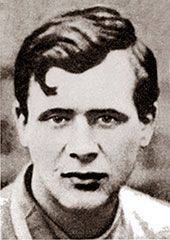 Novikov Alexander Alexandrovich - Commander of the Air Force of the Red Army, Chief Marshal aviation. During the Great Patriotic War, he skillfully and creatively used the main provisions of Soviet military science and military art for the construction and development of the Air Force, their operational, strategic and strategic application.
Novikov Alexander Alexandrovich - Commander of the Air Force of the Red Army, Chief Marshal aviation. During the Great Patriotic War, he skillfully and creatively used the main provisions of Soviet military science and military art for the construction and development of the Air Force, their operational, strategic and strategic application.A.A. Novikov was born 6 (19) in November 1900 in the village of Kryukovo of the Blaznovsky volost of the Nerekht district of the Kostroma province (now the Nerekhtsky district of the Kostroma region) in a poor peasant family.
His father, Alexander Ivanovich Novikov, was a non-commissioned officer, the St. George Cavalier, participated in the Russian-Japanese and First World Wars. Mother, Ekaterina Ivanovna, besides Alexandra brought up three more children. The father wanted to see his eldest son a learned man. Alexander graduated from elementary and second-grade schools and in 1915 passed the competitive exams at the Kineshma-Khrenovsky teacher's seminary. Upon completion of training at the seminary in May 1918, he became head of the out-of-school center in Nerekhtsky district, which included six volosts. The work was difficult. There was no transport, I had to walk. Alexander created rural libraries, organized amateur art circles, sorted literature seized from landowner libraries. However, he did not give up hope of getting a higher education and applied to the Ivanovo Polytechnic Institute for an agronomical faculty. But his studies did not last long: the time was hungry, and Alexander had to return to his native village.
In July, 1918 was the father of the future aviation marshal called up for the Red Army, and Alexander was the only breadwinner in the family. He again became a teacher, and then head of the Peshevsky school, located a mile and a half from his native village. Teaching, he helped his mother in housekeeping and in raising younger sisters and brother. They lived hard. The entire monthly salary of A. Novikov was pood rye flour, but it was an important source of existence for the whole family.
In the fall of 1919, Alexander himself was called up for service in the Red Army, sending him to the 27 Volga Reserve Infantry Regiment, which was stationed in Nizhny Novgorod. The regiment was located in the Tobolsk barracks. There was not enough firewood, I had to sleep without undressing. The food was scant. But the young fighters were not discouraged, stubbornly mastered the basics of military affairs, they lived in anticipation of joyful messages from the front. In early December, Novikov's 1919 as a competent and advanced Red Army man from a reserve regiment was sent to infantry command courses, which were located here in Nizhny Novgorod. While studying at the courses, Alexander organized the collective readings of newspapers, made reports on events at the fronts, helped his comrades with a low level of education. In May 1920, he joined the ranks of the RCP (b).
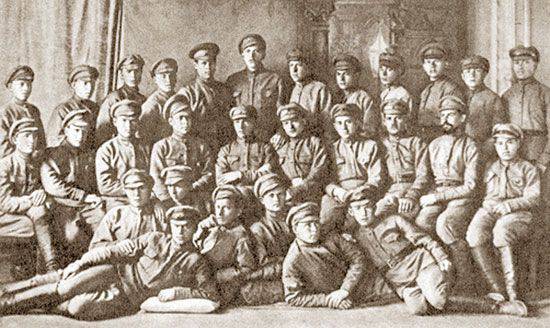
After graduating from the Nizhny Novgorod infantry courses of the commanders in June 1920, Mr. A.A. Novikov was appointed platoon commander and then assistant company commander of the 22 th infantry reserve regiment. In July of the same year, he was transferred by an assistant company commander to the 33 Infantry Regiment (Petrozavodsk), in which he participated in battles with belofin. In August 1920. Novikov became the head (chief) of intelligence of the 384 Infantry Regiment of the 43 Infantry Division. In February, Alexander Alexandrovich 1921 was appointed an adjutant to the food transport of the 127 Brigade, and in March he was transferred to Petrograd to the Chief of Staff of the 128 Infantry Brigade, in which he participated in suppressing the Kronstadt uprising, exercising control over troop reconnaissance in the zone offensive from the Fox Nose. After the end of the fighting, Novikov was left at the headquarters of the 128 Brigade as an assistant to the head of intelligence. But thoughts about studying, about mastering new knowledge never left the young commander.
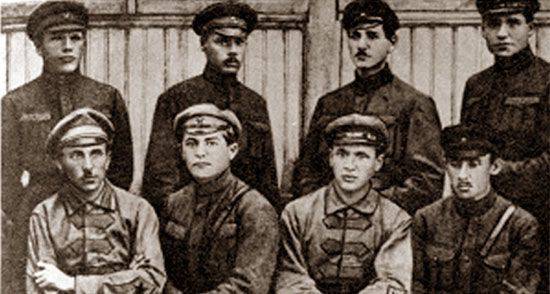
Higher Tactical and Rifle School commanders of the Red Army named after the III Comintern. Second right in the first row A.A. Novikov. 1922
In October, the 1921 of Alexander Novikov became a student of the Higher Tactical-Rifle School of the commanders of the Red Communist Party named after the III Comintern (later - courses "Shot"). After graduating with honors, in November 1922, he was sent as assistant company commander on the 14 Batumi infantry-command courses, and a month later on the 4 Armavir infantry-command courses for the same position. In January, 1923, at the request of the Chief of Staff of the Separate Caucasian Army, B.I. Kuznetsov, who knew Novikov in the Nizhny Novgorod courses, was transferred by the course commander to the Red Army University of this army in Tbilisi, and in March of that year he became the commander of the company of the military-political courses of the Caucasian Red Banner Army.
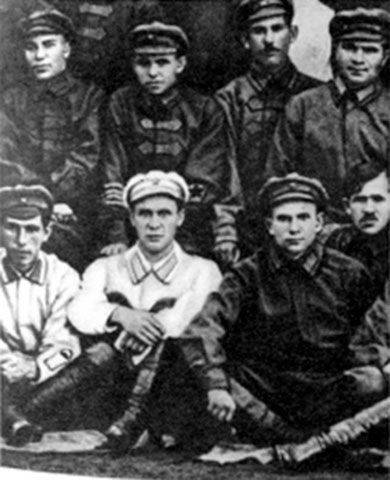
In the first row, second left, A.A. Novikov. 1925
Until October 1927 on the military-political courses of A.A. Novikov went through the ranks from the temporary serving post commander to the battalion commander. During his service he took part in battles against gangs of K. Cholokayev and in suppressing the Menshevik uprising in Georgia. At the same time A.A. Novikov devoted a lot of time studying artillery, armor and air force and other new military equipment. He was especially interested in aviation.
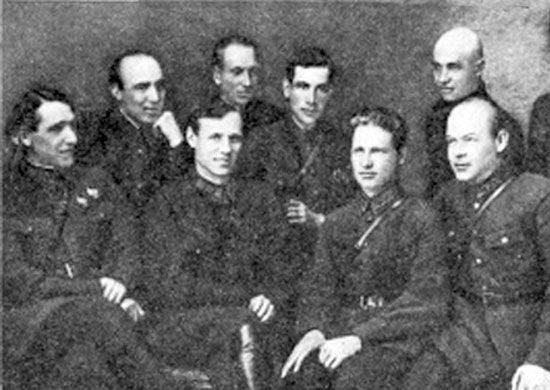
In the fall of 1927, A.A. Novikov entered the Military Academy. M.V. Frunze. At the academy, his interest in aviation did not fade. Alexander Alexandrovich carefully studied the work of A.V. Sergeeva “Strategy and tactics of the Red Air Fleet”, Met and talked with Professor A.N. Lapchinsky is the author of Aviation Tactics. This allowed in parallel with the main course of the Academy to deeply and comprehensively study aviation as well.
Academy A.A. Novikov graduated from the first category and in May 1930 was assigned to the Belarusian Military District (BVO) in Smolensk, where he became chief of intelligence, and from February 1931 - chief of operations department of the 11 Infantry Corps, commanded E.I. Kovtyukh. In Smolensk in the spring of 1931, Aleksandr Aleksandrovich meets the new commander of the district, I.P. Uborevich, who together with E.I. Kovtyukhom played a huge role in the future of Novikov. It was Uborevich who introduced into practice internships for staff commanders of infantry as observer pilots, where AA was one of the first in the district. Novikov. This was his first step on the road to aviation.
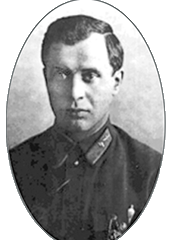
1933 In September 1932, after a successful exercise, Novikov was seconded to the district air force headquarters. And in March 1933 he was appointed chief of staff of the 450th aviation brigade in Smolensk. Deep military knowledge, a natural mind, the ability to quickly navigate the current situation helped him in a short time to understand the features of service in aviation, to study the personnel of subordinate units, to gain authority among colleagues.
Five months after the transition to aviation A.A. Novikov was instructed to lead the aviation group at a large pilot exercise that took place in the Minsk region. Squadrons were to attack from a low-flying column tanks on the march, carry out bombing on infantry fighting formations in the second echelon of the regiment's defense, conduct an air battle.
According to the results of the exercises, the commander of the district I.P. Uborevich was generally positive about the actions of aviation and its leadership. Once in aviation, Novikov decides to learn to fly. In a short time, he masters the aircraft and from the fortieth flight already operates the machine himself. After that, Aleksandr Aleksandrovich seeks to switch to flight work.
Autumn 1935 A.A. Novikov was appointed commander of the 42 th BVO Light Bomber Squadron. Without missing a single flight shift, he becomes the best, most prepared in part of the pilot. The example of their commander was followed by the crews of the entire squadron, which, by the end of the year, became one of the foremost in the district. For success in the service 28 March 1936, Mr. Aleksandr Aleksandrovich was awarded the military rank of colonel. All summer, the squadron under his leadership was preparing for maneuvers, which were planned to be held in the fall of 1936. The maneuvers of the commanders of the 1 rank I.P. Uborevich. People's Commissar of Defense K.E. Voroshilov, his first deputy M.N. Tukhachevsky, Chief of General Staff of the Red Army A.Ye. Egorov, members of the Central Committee of the Communist Party (Bolsheviks) and the Government of Belarus. The 42 Light Bomber Squadron rose six times into the sky, and all six times its actions were highly appreciated by the leadership of the Red Army.
In the summer of 1937, after the arrest of I.P. Uborevich, A.A. Novikov on a false accusation was removed from office and dismissed from the Red Army. He was severely reprimanded with a warning and entered into the registration card. However, in the reserve, Colonel Novikov stayed only five days. At the request of a member of the Military Council of the BVI, Army Commissioner 2, rank A.I. Mesiza, who had just been appointed to this position, to whom Aleksandr Aleksandrovich lodged a complaint of injustice, he was reinstated in military rank and position. Greater A.I. He did not have time to do this, as he himself was arrested. A little later, a party penalty was removed from Novikov, since in February 1938, his squadron won first place in the 116 Aviation Brigade for all indicators in combat training.
In April, Alexander Alexandrovich 1938 met with the former commander of the 450 Aviation Group E.S. Ptukhin, who now headed the Air Force of the Leningrad Military District (LVO). After this meeting, Novikov was appointed Chief of Staff of the District Air Force. From the first days a heavy burden fell on his shoulders. District airfields located on a vast territory. The technical reconstruction of parts and connections was in full swing. Air Force District received new aircraft at that time. It was necessary to control the course of military studies, prepare the troops for war. Based on the combat experience gained from Lake Hassan, it was necessary to make adjustments to operational and combat training of troops and headquarters, to clarify instructions for the use of aviation and the organization of interaction with ground forces.
The winter of 1939 came. 30 November began stubborn and bloody battles on the Karelian Isthmus, in which the aircraft of the LVO, transformed into the North-Western Front, took part. Chief of Staff of the Air Force Front Kombrig A.A. Novikov developed plans for delivering bombing and assault strikes on the leading edge, resistance centers and communications of the enemy, personally participated in combat missions, made a number of valuable tactical proposals on the military use of aircraft. For participation in hostilities on the Karelian Isthmus A.A. Novikov was awarded the Order of Lenin and 4 in May 1940. He was given the military rank of division commander (with 4.06.1940 - Major General Aviation).
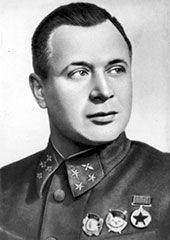
Air Force Commander
Leningrad military
District 1941
In the summer of 1940, Novikov for some time commanded the Air Force of the 8 th Army Armed Forces (Pskov), but was again returned to the post of chief of staff of the LVO Air Force. In August of the same year, he became Commander of the District Air Force.
Novikov's entry into the new position coincided with the holding of an experimental exercise with the landing of an airborne assault force. During the exercise, aircraft delivered guns, mortars, vehicles, tanks and other equipment. In the airborne brigade, single and group jumps of paratroopers with full equipment and armament from 400, 300 and 200 meters were made.
The district air force commander delved into all the details of the exercise, familiarized himself with the airborne combat equipment, specified the options for loading various types of transport aircraft. All this was necessary for the organization of closer cooperation between airmen and paratroopers. Novikov saw well the prospect of using the airborne troops and in every way promoted an increase in the rates of their development.
In the position of commander of the Air Force LVO and found AA Novikova Great Patriotic War. From the first days of work, he focused on raising the level of operational and tactical training for commanders and aviation headquarters, their combat readiness and the improvement of flight skills of crews. The development of events on the eve and in the first days of the war demanded that he take urgent and vigorous measures. With the outbreak of hostilities initiated by A.A. Novikov carried out the dispersal of the basing areas of aviation and masking airfields, which made it possible to minimize the loss of aircraft and give the enemy a proper rebuff. Having met with an experienced and well-organized enemy (in the north of Leningrad, Finnish aviation and the German 5 air fleet operating 900 aircraft operated), taking into account the lessons of the first days of the war, when in Western districts on airfields a sudden attack caused most of the aviation in the western districts , Aleksandr Aleksandrovich immediately decided to proceed to active hostilities: “We must not wait for the enemy, but be the first to strike at his forces and, above all, at enemy airfields”.
Competently assessing the situation and having received the consent of the Headquarters, Novikov began to prepare his aircraft for delivering massive attacks on enemy airfields in Finland. For this purpose, 540 aircraft were allocated, which are subordinated to the air forces of the Northern Front, the Baltic and Northern Fleets. First time in stories the Soviet Air Force to the simultaneous actions involved such a number of military equipment, and on the whole front - from Vyborg to Murmansk. For six days, from 25 to 30 in June 1941, the most important enemy airfields, many railway hubs, rear bases, and concentration areas of Finnish and Nazi troops preparing for the attack were subjected to massive strikes. The enemy's losses amounted to 39 aircraft (more than 130% of combat aircraft deployed in this operational direction), which forced the fascist command to pull its aircraft to distant rear bases and temporarily stop the raids on Leningrad.
During the preparation and conduct of air operations A.A. Novikov acted as a genuine innovator, constantly looking for new forms and methods of command and control: he introduced to the troops the experience of radio control of flight crews, as well as air force forces and equipment in the interests of the two (North-Western and Northern) fronts and the Baltic Fleet.
During the fighting on the Leningrad front in the most difficult months for the city, General Novikov in October 1941 was awarded the Order of the Red Banner and was promoted to lieutenant-general of aviation.
In February 1942, Mr. A.A. Novikov was appointed First Deputy Air Force Commander and a member of the Military Council of the Red Army Air Force. After taking office, and having been on the Western Front with GK Zhukov, having familiarized himself with the state and actions of the front-line aviation, he came to the conclusion that aviation was disconnected, it could not be assembled for a massive strike. Each general army tenaciously held on to its air units. Based on the experience of the struggle on the Leningrad front, he recommended the creation of a single attack aviakulak, at least a mixed air corps, consisting of fighters, attack aircraft and bombers. After visiting the North-Western Front, he proposed aviation to fly on wheels in winter, without skis, which reduced the maneuverability of the vehicles.
11 April 1942 A.A. Novikov became the commander of the Red Army Air Force, and two weeks later, on April 26, he became Deputy Defense Commissar for Aviation. In these positions, he was until the end of World War II. The appointment of Alexander Alexandrovich took place in the midst of organizational changes in the Air Force. The formation of shock aviation groups was in full swing. Parts and formations of long-range bomber aviation were reorganized into long-range aviation, headed by Major General A.Ye. Golovanov.
At the same time, the restructuring of the organizational structure of the central air force began. Almost all departments of the headquarters were turned into directorates, which were headed by the most prepared generals and commanders who showed themselves in a difficult initial period of the war. The creation of new directorates and services made it possible to expand the functions of the headquarters in matters of the operational use of aviation and the leadership of the front air force headquarters.
A.A. Novikov constantly analyzed the state of affairs at the fronts and increasingly convinced that the dispersal of aviation across all-arms armies did not meet the basic principles of centralized control and massive use of aviation on a front-line scale, and did not ensure the achievement of high effectiveness of its combat operations. At the suggestion of Alexander Alexandrovich, in May 1942, on the basis of the air forces of the fronts and combined arms armies, air armies began to be created, and a little later, air corps and air divisions of the High Command Reserve. This fundamental restructuring of the aviation structure of the Air Force was of great importance: it allowed centrally managing all the forces of aviation, solving not only operational and tactical, but also strategic tasks. The new organizational structure of the Air Force has become one of the most important factors in the Soviet air force gaining complete air supremacy, and then winning the air war.
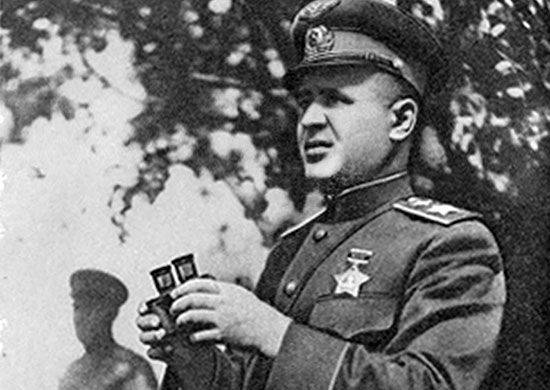
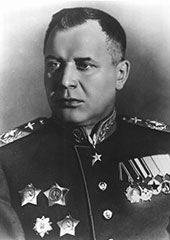
A.A. Novikov. 1944
During the Great Patriotic War, Colonel General Aviation A.A. Novikov (18.01.1943, with 17.03.1943 - Air Marshal, with 21.02.1944 - Chief Air Marshal) was the representative of the Supreme High Command.
In this position, he proved himself not only as an outstanding commander, commander, but also as a courageous innovator, a theorist in matters of the combat use of aircraft, her close cooperation with ground forces. A.A. Novikov was the organizer of the air blockade of the encircled enemy forces at Stalingrad (December 1942 - February 1943).
Coordinated aviation operations of several fronts to destroy enemy aircraft in air battles in Kuban (spring 1943), at Kursk Bulge (July 5 - August 23 1943), participated in operations to liberate Smolensk and Smolensk Region (September 1943) , Right-Bank Ukraine (spring 1944), the Karelian Isthmus and Vyborg (summer 1944), Belarus (July-September 1944), the elimination of the enemy grouping in East Prussia and the storms of Konigsberg and Berlin (spring 1945), and then in the war with Japan
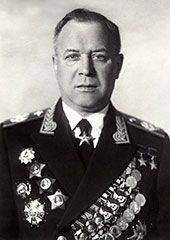
A.A. Novikov. 1960-s.
. During the fighting in the Far East in August 1945, Mr. A.A. Novikov coordinated the interaction of air armies, where, along with the massive use of fighters, attack aircraft and bombers, military transport aircraft were also widely used: not only to provide troops with fuel, ammunition and food, but also to land airborne troops.
By decree of the Presidium of the Supreme Soviet of the USSR 17 on April 1945, the Chief Marshal of Aviation Novikov Alexander Alexandrovich "for the exemplary performance of the combat missions of the Supreme Command at the front of the struggle against the German invaders and shown courage and heroism" was awarded the title Hero of the Soviet Union and awarded the Order of Lenin and Gold Star Medal He received the second Gold Star Medal 8 of September 1945, “for exemplary performance of the combat tasks of the command on the front of the fight against the Japanese militarists”.
After World War II, the fate of A.A. Novikov has developed tragically. Despite the fact that he was a deputy of the Supreme Soviet of the USSR 2-th convocation (in 1946-1950), on the fabricated "aviation case" of 22 on April 1946, he was removed from the post of Air Force commander and arrested. Alexander Alexandrovich was accused of deliberately releasing low-quality aircraft that caused the death of pilots and vehicles. Under the beatings pleaded guilty. 11 of May 1946 of the Military Collegium of the USSR Supreme Court condemned him to five years of imprisonment under article 193-17 of section “a” of the Criminal Code of the RSFSR. By decree of the Presidium of the Supreme Soviet of the USSR from 20 May 1946, A.A. Novikov was deprived of the military title of the Chief Marshal of Aviation, the honorary title of twice Hero of the Soviet Union, orders and medals.
12 February 1952 A.A. Novikov was released from prison. 29 May 1953. By the decision of the Military Collegium, his case was reviewed and his conviction was lifted for lack of corpus delicti. 12 June of the same year, the Presidium of the Central Committee of the CPSU issued a decision on the rehabilitation of A.A. Novikov. By decree of the Presidium of the Supreme Soviet of the USSR from 13 June 1953, he was returned to the military rank, the title of Hero of the Soviet Union and all state awards. 29 June he was appointed Commander of Long-Range Aviation. He performed the duties of the Commander of Long-Range Aviation until March 1955, simultaneously with 1954 being the Deputy Commander-in-Chief of the Air Force. After a long break, A.A. Novikov undertakes to revise the concept of development and use of long-range aviation. He takes energetic measures to equip it with airplanes with a large radius of action and increased payload. However, his proposals did not find due understanding from the country's military-political leadership, headed by N.S. Khrushchev. Nevertheless, a solid, scientifically based conviction in the right, allowed him to defend his point of view on equipping the connections and parts of the Long-Range Aviation, where the most modern strategic turboprop and jet bombers capable of carrying nuclear weapon.
In January, 1956 for health reasons A.A. Novikov was dismissed from the army in the reserve with the right to wear military uniforms and left for Leningrad. He decided to devote himself to the education and training of pilots of the Civil Air Fleet. His request was granted, and in August 1956 he was appointed head of the Higher Aviation School of the Civil Air Fleet in Leningrad. At the same time A.A. Novikov headed the department of flight operation and engaged in teaching. In 1958, he was given the title of professor.
In school A.A. Novikov worked for ten years. Under his leadership, a whole galaxy of civil aviation managers was brought up, the foundation of the material and technical base of the educational institution was laid, research work was launched. For services to the training of specialists and contribution to the development of science in September 1961, Alexander Alexandrovich was awarded the Order of the Red Banner of Labor.
A.A. Novikov made reports on the history of aviation and the operational and tactical art of the Air Force during the Great Patriotic War. He wrote the memoirs “In the sky of Leningrad. Notes of the Commander of Aviation "," Normandy "," In the sky of Russia "," Jet vehicles in transport aircraft ", textbooks and works on the history of Soviet aviation (articles" Soviet aviation in the battles for Königsberg "," Soviet pilots in the battles for the Motherland " , “On the far south-western approaches to Leningrad”, “On the Karelian Isthmus”, “In the Battle of Berlin” and others).
In 1966, Aleksandr Aleksandrovich suffered a severe stroke and completely retired. Died A.A. Novikov 3 December 1976, buried at Novodevichy cemetery in Moscow.
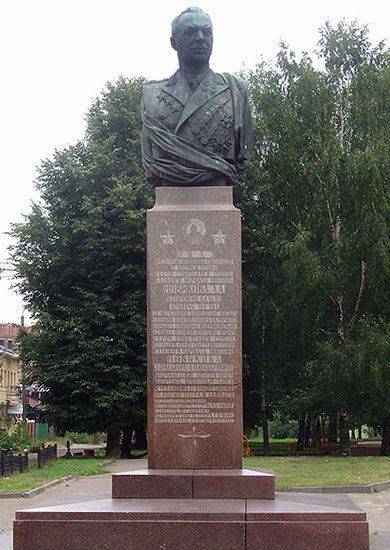
Marshal of Aviation A.A. Novikov in Kostroma.
In accordance with the Statute of the title of Hero of the Soviet Union, in 1958, a bronze bust of the main air marshal A.A. was installed on Komsomolskaya Square in Kostroma. Novikova (sculptor EV Vuchetich). In December 1972, Mr. A.A. Novikov was awarded the title "Honorary Citizen of Kostroma". Streets in Moscow, St. Petersburg, Kostroma and Kaliningrad, as well as the State Secondary Special Educational Institution “Aviation Transport College of Civil Aviation” (St. Petersburg) are named after him. The name of the Chief Air Marshal A.A. Novikov wore Balashov Higher Aviation School of Pilots (14.05.1977-1.09.2002).
Awarded: 3 with the Order of Lenin, 3 with the Orders of the Red Banner, 3 with the Orders of Suvorov of the 1 st., The orders of Kutuzov. 1 of the st. and the Red Banner of Labor, the 2 Orders of the Red Star, many medals, as well as foreign orders: the French - Legion of Honor 2 st., the US - Legion of Honor 1 st., Mongolian - Fighting Red Banner.
Information